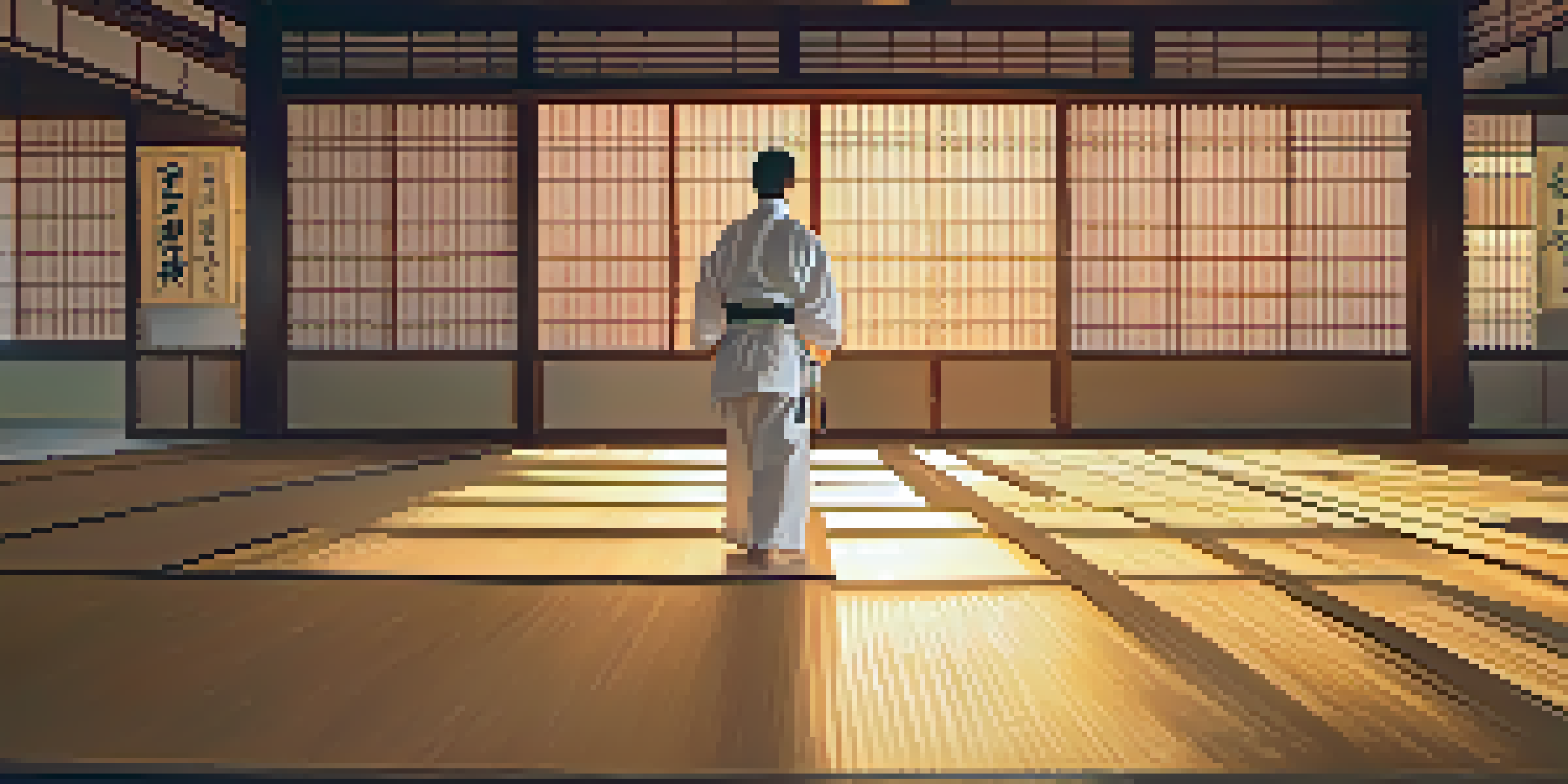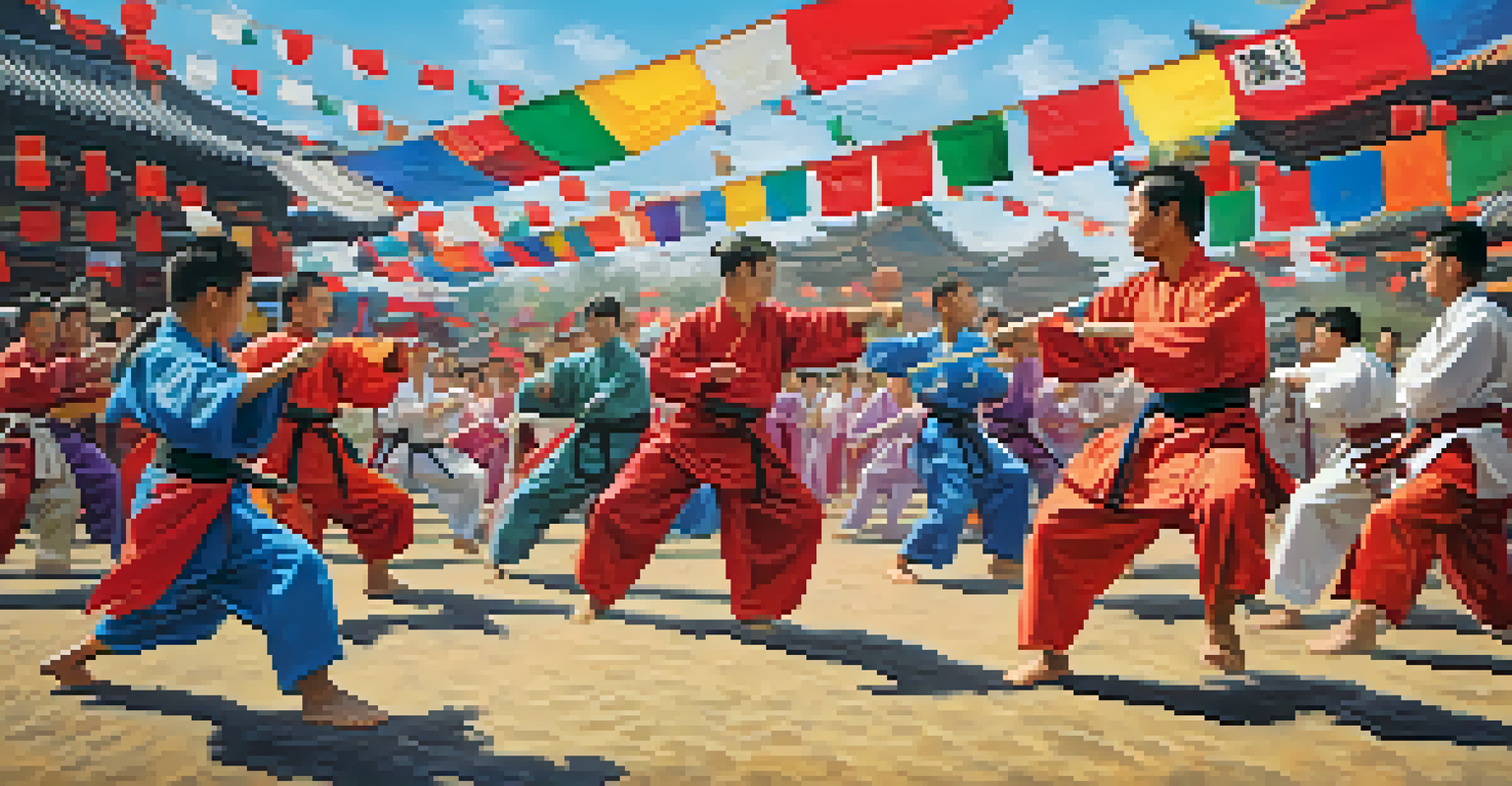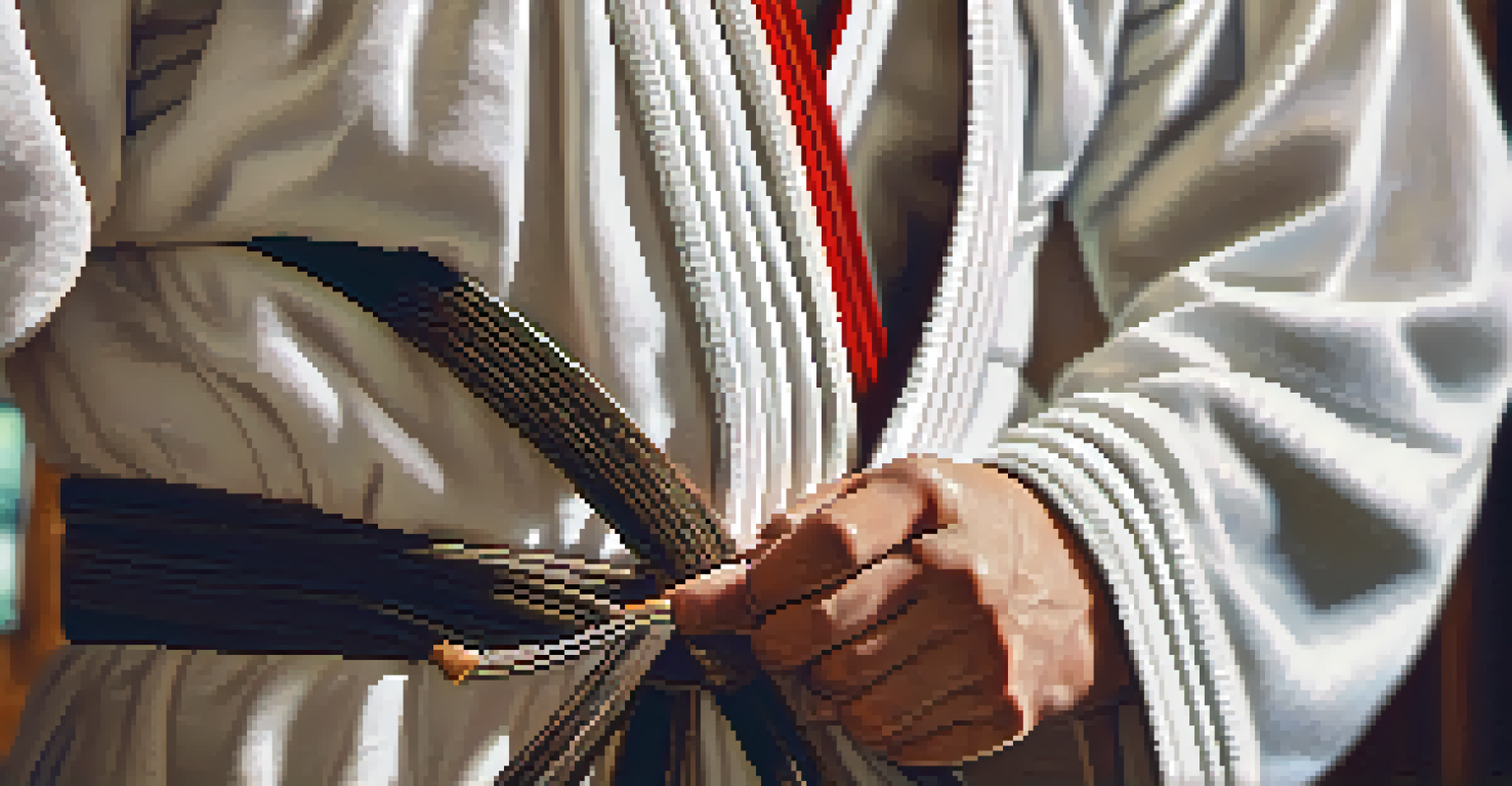Martial Arts Rituals: A Window into Cultural Heritage

Understanding Martial Arts Rituals and Their Importance
Martial arts rituals serve as a bridge between physical practice and cultural identity. They embody the values and beliefs of the culture from which they originate, making each discipline unique. For instance, the bowing before a match in Karate signifies respect and humility, core tenets of the practice.
Martial arts are not just about fighting; they are about the discipline and respect that are built along the way.
These rituals are not just ceremonial; they foster a sense of community among practitioners. When students engage in these traditions, they connect with a lineage that spans generations. This connection not only enriches their training but also instills a deeper understanding of their art form.
Additionally, rituals often include spiritual elements that promote mental focus and discipline. Whether it's meditation in Kung Fu or the chanting in Capoeira, these practices enhance a martial artist's journey, merging physical prowess with inner strength.
Cultural Significance of Rituals in Different Martial Arts
Different martial arts around the world showcase their cultural roots through various rituals. For example, Brazilian Jiu-Jitsu emphasizes the importance of the 'gi' and its proper wearing, which reflects the Brazilian culture of respect and pride. This ritual not only prepares the practitioner physically but also mentally for the challenges ahead.

In contrast, the traditional Japanese martial arts, like Kendo, incorporate rituals such as the 'Shinai' bowing, symbolizing the readiness to engage with honor. These practices highlight the emphasis on etiquette and discipline in Japanese culture, illustrating how martial arts can serve as a microcosm of societal values.
Rituals Foster Community in Dojos
Shared rituals in martial arts create a sense of belonging and camaraderie among practitioners, enhancing their overall training experience.
Moreover, the rituals in Muay Thai, such as the 'Wai Khru,' are steeped in spiritual significance. This dance pays homage to teachers and ancestors, reinforcing the ties between practitioners and their heritage. Such rituals deepen the practitioner's appreciation for their art and its history.
Rituals as a Tool for Personal Growth in Martial Arts
Engaging in martial arts rituals can significantly contribute to personal growth. The repetitive nature of rituals, like bowing or meditation, fosters discipline and perseverance. These qualities not only enhance martial arts practice but also translate into everyday life, helping practitioners tackle challenges outside the dojo.
Tradition is not the worship of ashes, but the preservation of fire.
Through rituals, martial artists learn the importance of patience and respect for tradition. This understanding cultivates a mindset that values continuous improvement, which is vital in martial arts and broader life experiences. The discipline acquired through these practices can lead to increased self-confidence and resilience.
Additionally, rituals often serve as a moment of reflection, allowing practitioners to connect with their inner selves. This introspective aspect can lead to greater emotional awareness and stability, equipping individuals to manage stress and adversity more effectively.
The Role of Rituals in Building Community Among Practitioners
Martial arts rituals play a crucial role in fostering community among practitioners. By participating in shared rituals, students build camaraderie and a sense of belonging. This communal aspect can be especially important for beginners, as it creates a supportive environment for growth and learning.
Events such as 'belt ceremonies' in different martial arts signify collective achievements and milestones. Celebrating these moments together strengthens bonds and reinforces the idea that everyone is on a shared journey. Such rituals create lasting memories that enhance the overall experience of training.
Cultural Heritage Through Rituals
Martial arts rituals preserve cultural identity and values, ensuring that traditions are passed down through generations in a globalized world.
Furthermore, the communal aspect of rituals often extends beyond the dojo. Practitioners may participate in cultural festivals or demonstrations that showcase their art to the broader community. This not only promotes the martial art itself but also nurtures relationships and engages the community in cultural exchange.
Rituals as a Reflection of Societal Values
Martial arts rituals often mirror the values and beliefs of the societies they come from. For instance, the emphasis on respect in many Asian martial arts is deeply rooted in the cultural significance of honor and hierarchy. This reflects the societal norms that prioritize respect for elders and teachers, shaping the way practitioners interact with one another.
Similarly, the rituals in African martial arts, like the 'Umsebenzi' in Zulu culture, emphasize community and collaboration. These rituals often celebrate the collective strength of the group, highlighting the importance of unity and support in achieving common goals. Such practices underscore the communal values that are essential in these cultures.
By understanding these societal influences, practitioners can appreciate the broader context of their martial arts. This awareness can deepen their connection to the art form and inspire them to embody these values in their training and daily lives.
Preserving Cultural Heritage Through Martial Arts Rituals
Martial arts rituals play a vital role in preserving cultural heritage. As traditions are passed down through generations, they ensure that the values and teachings of the past remain alive. Practicing these rituals helps maintain cultural identity, especially in a rapidly globalizing world.
In many cases, martial arts schools serve as cultural hubs where traditions are taught and celebrated. For example, Capoeira schools often incorporate music and dance, reflecting the African and Brazilian heritage that shapes this art form. This not only preserves the art but also educates new generations about their cultural roots.
Personal Growth via Martial Arts
Engaging in martial arts rituals cultivates discipline, patience, and emotional awareness, contributing significantly to personal development.
Moreover, as martial arts gain global popularity, there's a growing awareness of the need to honor these rituals. Practitioners from various backgrounds are increasingly recognizing the significance of these traditions, fostering a greater appreciation for cultural diversity. This cultural exchange enriches the martial arts community and promotes respect for different heritages.
The Future of Martial Arts Rituals in a Globalized World
As martial arts continue to spread globally, the future of rituals is both promising and challenging. On one hand, the sharing of practices can lead to a richer exchange of ideas and traditions. This cross-pollination can enhance martial arts disciplines, making them more inclusive and dynamic.
On the other hand, there's a risk of diluting the original cultural significance of these rituals. As practitioners from diverse backgrounds engage in martial arts, it's crucial to approach traditions with respect and understanding. Preserving the essence of these rituals while promoting inclusivity will be key to maintaining their authenticity.

Ultimately, the future of martial arts rituals hinges on striking a balance between tradition and evolution. By honoring the past while embracing new influences, practitioners can ensure that these rituals continue to thrive and serve as a testament to the rich cultural heritage they represent.